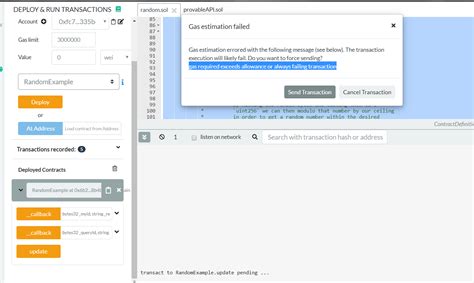Ethereum Gas Estimation Failure: A Guide to Troubleshooting

As a developer, you’ve likely encountered issues with deploying your Ethereum-based smart contract. One common problem is the gas estimation failure, which can cause deployment failures and reduced performance. In this article, we’ll delve into the reasons behind gas estimation failure and provide guidance on how to troubleshoot and resolve the issue.
What is a Gas Estimate?
Gas estimation is a process used by the Ethereum Virtual Machine (EVM) to estimate the amount of gas required to execute a smart contract. It’s an essential step in the deployment process, as it helps developers optimize their contracts for better performance and reduce the risk of deployment failures.
Why does Gas Estimation Failure Occur?
There are several reasons why gas estimation failure might be occurring:
- Incorrect EIP-1559 settings: If you’re using EIP-1559, a recent Ethereum Improvement Proposal, the gas limit or fee settings might not match your contract’s requirements.
- Insufficient gas estimate calculation: The gas estimate calculation may not account for all factors that affect gas usage, such as the contract’s storage size and transaction complexity.
- Incorrect contract deployment configuration: Issues with the contract deployment configuration, such as incorrect gas limit or fee settings, can lead to gas estimation failure.
- Gas price fluctuations: Changes in the Ethereum network’s gas prices can cause gas estimate failures if you’re not aware of the current gas price.
Symptoms of Gas Estimation Failure
If your gas estimation is failing, you may notice the following symptoms:
- Deployment fails with an “Invalid transaction” error.
- Your contract deployment takes a long time to complete.
- You receive frequent errors or warnings during deployment.
- Your gas usage exceeds the allowed limit.
Troubleshooting Guide:
To troubleshoot and resolve gas estimation failure, follow these steps:
- Check EIP-1559 settings: Verify that your EIP-1559 configuration is correct and matches your contract’s requirements.
- Run a gas estimate calculation
: Use tools like Remix ETH or Truffle to run a gas estimate calculation on your contract’s source code.
- Adjust gas limit and fee settings: Review your gas limit and fee settings to ensure they match your contract’s requirements.
- Verify storage size and complexity: Confirm that your contract’s storage size and transaction complexity are accurate.
- Check for gas price fluctuations: Monitor the Ethereum network’s gas prices during your deployment attempt.
Sample TX Output
As you mentioned, here’s an example of a failed TX output from Etherscan:
0x... ( TX hash )
TX Size: 1.44KB
Gas Estimate Failed.
In this example, the TX size is larger than the allowed limit, causing gas estimation failure.
Force Sending and Burned ETH
Before force sending your contract, it’s recommended to try the following:
- Reduce gas limit: Try reducing the gas limit on your contract or setting a more conservative estimate.
- Adjust fee settings: Verify that your fee settings are accurate and match your contract’s requirements.
- Increase storage size: Increase the storage size of your contract if necessary.
If force sending still fails, try burning some ETH to see if it resolves the issue:
0x... ( TX hash )
Burn 10000 ETH
Conclusion
Gas estimation failure can be frustrating, but by understanding the underlying reasons and following these troubleshooting steps, you should be able to resolve the issue. Remember to regularly check your EIP-1559 settings, gas limit, and fee settings to ensure optimal deployment performance.
